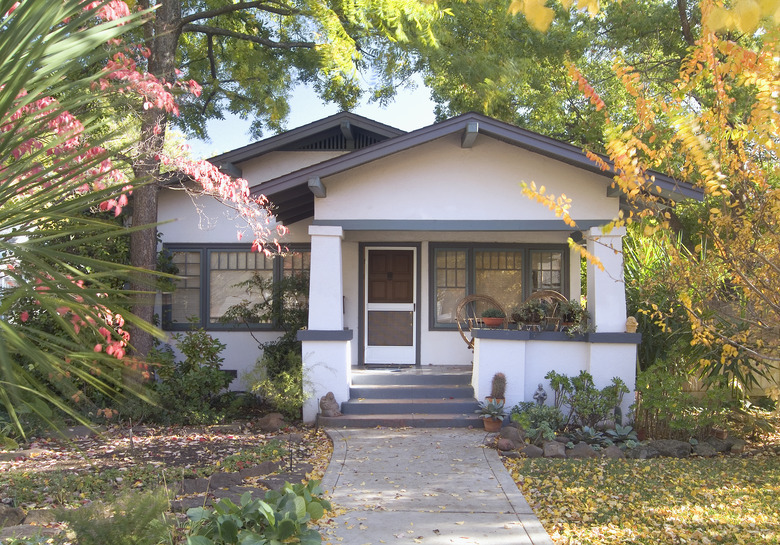What Is An Escrow Account? Here's Everything You Need To Know
A homebuyer needs an escrow account at two different stages of the homebuying process and for different reasons. The first account is opened when the buyer and seller agree to an offer and sign the papers, and the second one is opened on the buyer's behalf at closing. A third party maintains both escrow accounts and releases the funds when particular conditions are met: in the first case, when the sale successfully closes, and in the second case, when the property taxes and insurance bills come due.
You might be hesitant to hand over a large sum of money to a bank or mortgage servicer, but it's actually a necessity. Holding some of the buyer's money in escrow during the period between acceptance of the offer and closing is the only practical way of ensuring the buyer is serious about the offer and won't simply walk away. And, both the mortgage lender and the borrower benefit from an escrow account during the mortgage period because it ensures that tax and insurance payments stay up to date.
Tip
An escrow account is set up by a third party to hold funds. When you make an offer on a house, your earnest money is held in an escrow account until the sale closes. After closing, a second escrow account holds funds that you pay into monthly to be disbursed when taxes and insurance payments come due.
What Does "in Escrow" Mean?
What Does "in Escrow" Mean?
The period between the acceptance of an offer and the signing of the closing papers is known as the escrow period, which refers to the escrow account opened on behalf of the buyer by the buyer's real estate agent or the seller's real estate agent, an escrow agent or a title company. The money deposited into this account is called earnest money, and it's typically 1 to 3 percent of the sale price.The buyer's agent typically collects this money from the buyer in the form of a certified check or money order and deposits it in the account of the escrow company specified in the purchase agreement. If the sale successfully closes, this money is applied to the closing costs or added to the down payment.
The buyer has opportunities during the escrow period to call off the sale and get the earnest money back, however. If the property appraisal comes in lower than the agreed-upon sale price and the lender withdraws financing, the deal falls through, and the earnest money is returned unless the buyer and seller can agree to different terms. Another opportunity occurs if any of the home inspections reveal previously unknown major problems. If the buyer and seller can't agree on who should pay for them, the buyer usually has grounds to get the earnest money back and walk away.
Buyers and sellers often agree to contingencies that must be satisfied for the sale to occur, and if they aren't met, that's grounds to close the escrow account and refund the earnest money to the buyer. A financing contingency is common, requiring the borrower to secure a mortgage loan for the sale to proceed, and also common — although less so — is a home sale contingency, requiring the sale of the buyer's previous home. The home sale contingency is often requested by buyers to prevent them from having to make mortgage payments on two properties.
Opening an Escrow Account at Closing
Opening an Escrow Account at Closing
When borrowers refinance or purchase a new house and take out a mortgage loan, they take on the responsibility not only of paying back the loan but also of paying the property taxes and homeowners' insurance premiums. Because it's in their interest that these payments are made on time, mortgage companies usually set up a mortgage escrow account from which these payments can be made. They calculate the total yearly cost of taxes and insurance premiums, divide it by 12 to get a monthly cost and tack that to the monthly mortgage payment along with any private mortgage insurance payments they require. The part of the monthly payment that doesn't pay the loan principal and interest goes into the escrow account.
A mortgage that includes an escrow account is sometimes called a PITI mortgage because it includes payments for principal, interest, taxes and insurance. Borrowers have to make a larger monthly payment but never have to worry about coming up with large biannual tax payments themselves, so a mortgage escrow account is something of a convenience. It's especially handy that the mortgage company handles all the transactions and paperwork.
Depending on the lender, it may be possible to opt out of opening an escrow account but not when applying for USDA or FHA loans. These types of loans always require an escrow account. When applying for conventional loans, borrowers with good credit can often opt out if they have a 20 percent or larger down payment, and borrowers seeking a VA loan can opt out if they have at least a 10 percent down payment.
How an Escrow Account Works
How an Escrow Account Works
When you open an escrow account, the mortgage lender does an escrow analysis, adding the yearly tax and insurance payments and calculating an amount to add to the monthly payment, and that amount goes into a separate account maintained by the lender. The goal of the analysis is to make sure there's enough in the account to make payments when the due dates arrive, but if the due date occurs soon after the closing date, you may have to pay extra to top off the escrow account, and that amount will be added to the closing costs. After that, the lender does a yearly analysis, and if the tax bill or insurance premium goes up, so do the escrow payments.
In the unlikely case that the opposite happens and your tax bill goes down, you'll have an overage in your escrow account at the end of the year. You'll typically receive a check if the overage is more than $50, but if it's less than that, it will usually be applied as a credit to your mortgage payment. Escrow works best and your payments are most predictable when everything stays the same, but it seldom does, so you have to be prepared for yearly fluctuations in your mortgage payments to ensure your escrow balance is large enough to pay all the bills.
Pros and Cons of an Escrow Account
Pros and Cons of an Escrow Account
The convenience of not having to worry about due dates for taxes and insurance is a definite advantage for homeowners, and it's a relief to not have to worry about coming up with a big chunk of cash when those dates arrive. To add to the benefits, most mortgage companies will handle all the paperwork involved with switching insurance payments to a new insurance company if you have to do that. There's a tradeoff for all this convenience. When taxes and insurance are part of your monthly mortgage payment, the payment is larger, sometimes significantly so. Besides that, money sitting in an escrow account isn't working for you; you can't invest it, and it may not even earn interest.
Having an escrow account doesn't mean you won't have extra monthly expenses because it doesn't pay for things like utilities, homeowners' association fees, a home warranty and supplemental taxes. Supplemental taxes are one-time taxes that are levied when the property value is reassessed and is found to have increased in value, which typically happens when a home is sold in a rising market. They aren't included in the escrow analysis that calculates the monthly escrow payments, and they can catch you by surprise.
Putting it all together, the benefits of having an escrow account outweigh the drawbacks for most homeowners. It saves time and paperwork, and it provides the security of knowing the taxes and insurance will be paid on time.


